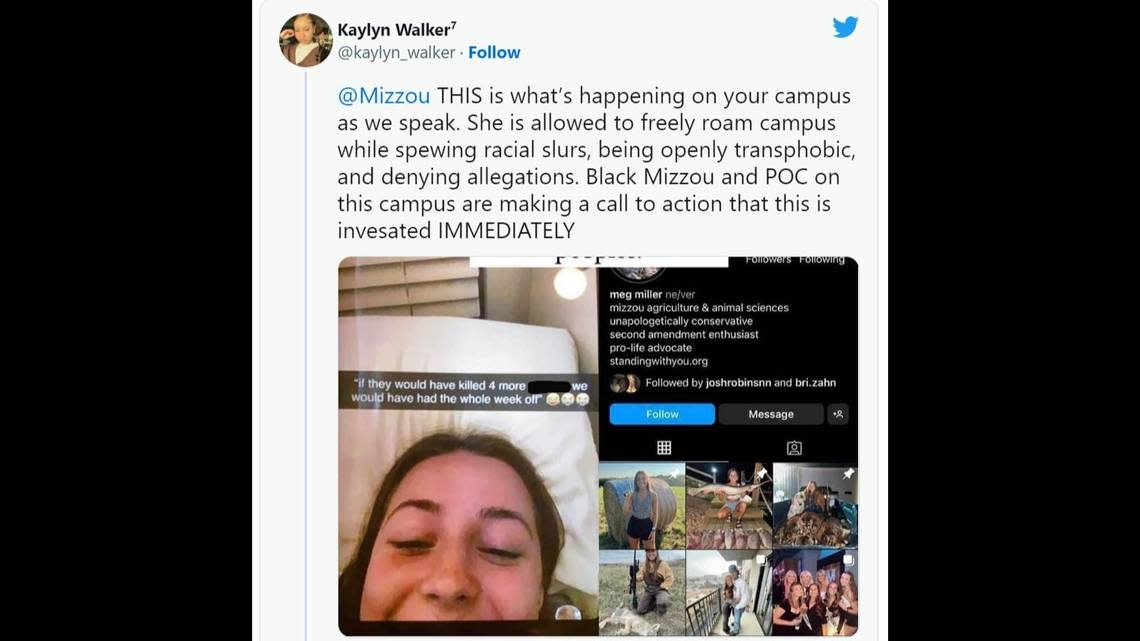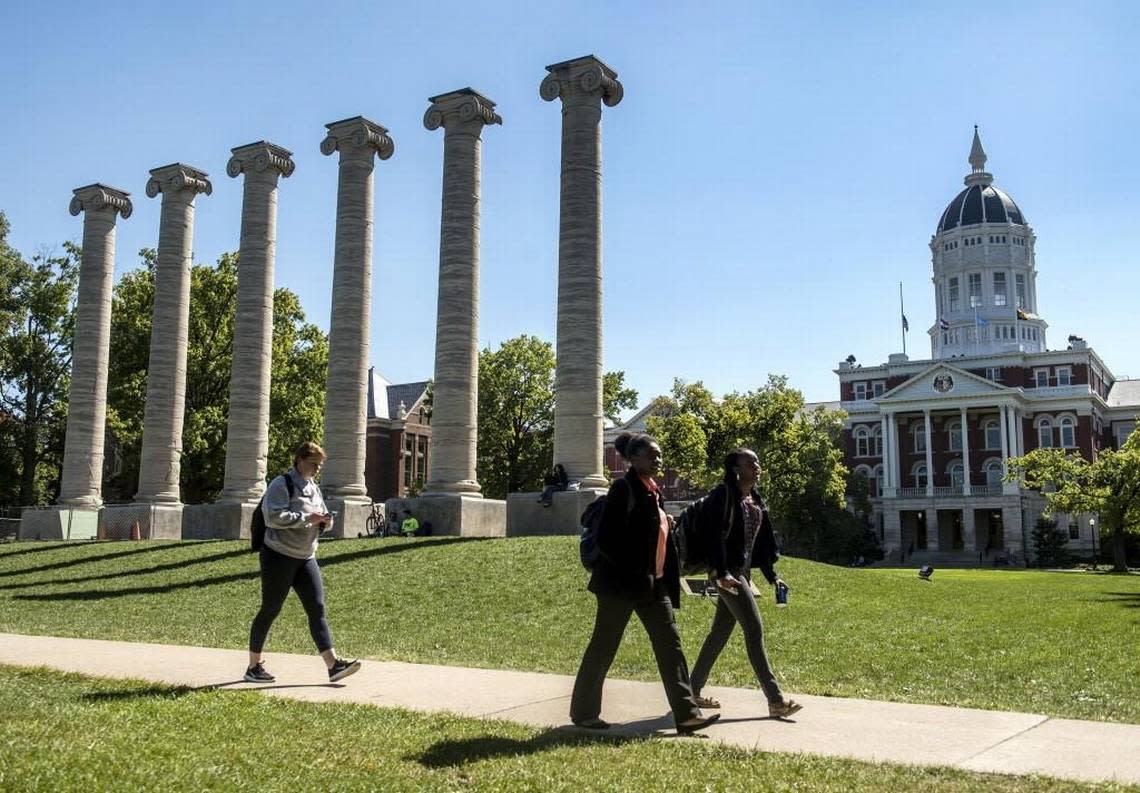Mizzou will not punish student over racist message, citing First Amendment protections
Over the objections of students, University of Missouri officials determined they have no grounds to discipline or expel a former conservative club leader over a racist social media message, saying she was exercising her First Amendment rights.
In a Snapchat message shared by students last month, student Meg Miller used a racial slur, saying: “If they would have killed 4 more n----- we would have had the whole week off,” followed by crying laughing emojis.
While it is unclear what Miller was referencing, her message hearkens back to 1986, on the first federal holiday marking the birthday of the Rev. Martin Luther King Jr., when disc jockey Doug Tracht said on the air that killing “four more” would result in getting the rest of the week off.
MU spokesman Christian Basi said that Miller sent the message directly to a friend on Snapchat, and that it was not publicly posted. But screenshots of the message spread on social media, sparking outrage among students who have pleaded for the university to immediately bar her from campus. Shortly after, Miller resigned as president of the MU chapter of Turning Point USA, a far-right student club.
“THIS is what’s happening on your campus as we speak,” MU student Kaylyn Walker wrote on Twitter in response to Miller’s message. “She is allowed to freely roam campus while spewing racial slurs, being openly transphobic, and denying allegations. Black Mizzou and POC on this campus are making a call to action that this is (investigated) IMMEDIATELY.”
MU officials in December condemned the message, saying the “language is reprehensible,” and placed the matter under review.
On Monday, officials said after a “thorough review that examined the origin and context around the message,” the university determined it cannot discipline the student due to First Amendment protections.
“First Amendment law does not allow a public university to punish speech only because it is racist or hateful — even when that speech is diametrically opposed to our values,” Mun Choi, president of the University of Missouri System, said in a statement. “Our university community will not be defined by the actions of one individual, but instead by our deep and collective commitment to be welcoming to all.”
The university’s review, Choi said, found that the student’s racial slur was used in a direct message to a friend “and was not communicated in a way that harassed any individual. In that context, the speech is protected by the First Amendment to the U.S. Constitution.”
The First Amendment protects speech regardless of how offensive it is. Restricting speech on public university campuses violates the Constitution and amounts to government censorship, said Lawrence attorney Max Kautsch, who focuses his practice on First Amendment rights and open government law.
Public universities, he said, must meet a high standard to regulate off-campus speech, such as proving that the speech constitutes targeted harassment or a threat, creating a safety concern or hostile environment for students.
University officials determined that Miller’s message did not rise to that level.
“The fact that (the message) is not targeting anyone totally eliminates the university’s ability to do anything,” Kautsch said.
“Are there social consequences that come from making statements like this? Absolutely there are. But can the government penalize somebody for making a statement like that? I don’t think so,” he said. “That would be content-based censorship. That’s not legal.”
The Star was unable to immediately contact Miller on Monday.
Miller’s case echoes an incident at Kansas State University in 2020, when officials decided they would not expel the student who posted offensive tweets about George Floyd. Jaden McNeil, who was head of K-State’s controversial America First Students chapter, tweeted about Floyd, a 46-year-old Black man killed under the knee of a white police officer on a Minneapolis street the previous month, sparking national protests.
McNeil tweeted: “Congratulations to George Floyd on being drug free for an entire month!” While many urged the university to kick him off campus, officials said it was a free speech issue and they did not have the right to expel him.
University of Missouri officials said in a letter to the campus on Monday, “that the First Amendment has limits, and we have and will take action when individuals are subjected to harassment that violates our rules prohibiting discrimination.”
Officials said within the last year, “we dismissed a student who directed a racial slur at a fellow student.”
Miller’s Instagram bio states she “unapologetically conservative,” a “second amendment enthusiast” and “pro-life advocate.”
One of Miller’s previous posts, shared widely on social media, shows her posing with Kyle Rittenhouse, the teenager acquitted of criminal charges in the fatal shooting of two men and the wounding of another during a Wisconsin protest in 2020 over the police shooting of Jacob Blake, a Black man. The photo included the hashtags “#fangirlmoment” and “#gunrightsarewomensrights.”
In another post, Miller is shown hunting, posed next to a dead deer, with the caption, “pulled a rittenhouse.”
The national Turning Point USA organization said in a statement to The Star that Miller quit without explanation last month. The nonprofit said of her Snapchat message that, “This kind of language has no place at TPUSA, and we support her decision to remove herself from all involvement with that local chapter.”
Outrage over Miller’s language comes after years of building racial tensions on campus.
The editorial board of MU’s student newspaper, The Maneater, wrote in a column last month that Miller’s posts, “follow increasingly brazen public displays of white-supremacist propaganda and hate speech on the MU campus.”
Earlier this fall, white supremacist flyers were found on MU’s campus. The Faculty Council denounced the flyers and said in a statement that, “While posting the flyers may not violate university policies on free speech, it is important to acknowledge that the flyers display messages of hate, which have been associated with a history of racist violence in the U.S.”
For the past several years, students have protested to the administration to improve the racial climate on campus and hire more faculty members of color.
Concerned Student 1950, a predominantly black group, orchestrated a series of protests in 2015, which included a student hunger strike and a boycott by Mizzou football players. The protests drew national attention and led to the resignation of UM System President Tim Wolfe and the reassignment of MU Chancellor R. Bowen Loftin.
Choi said on Monday that the university “welcomes individuals with diverse backgrounds, experiences and perspectives. Our university community will not be defined by the actions of one individual, but instead by our deep and collective commitment to be welcoming to all.”
In the coming weeks, Choi said, faculty, students and staff will be invited to meet with university leaders to share input on creating a more inclusive environment on campus.


